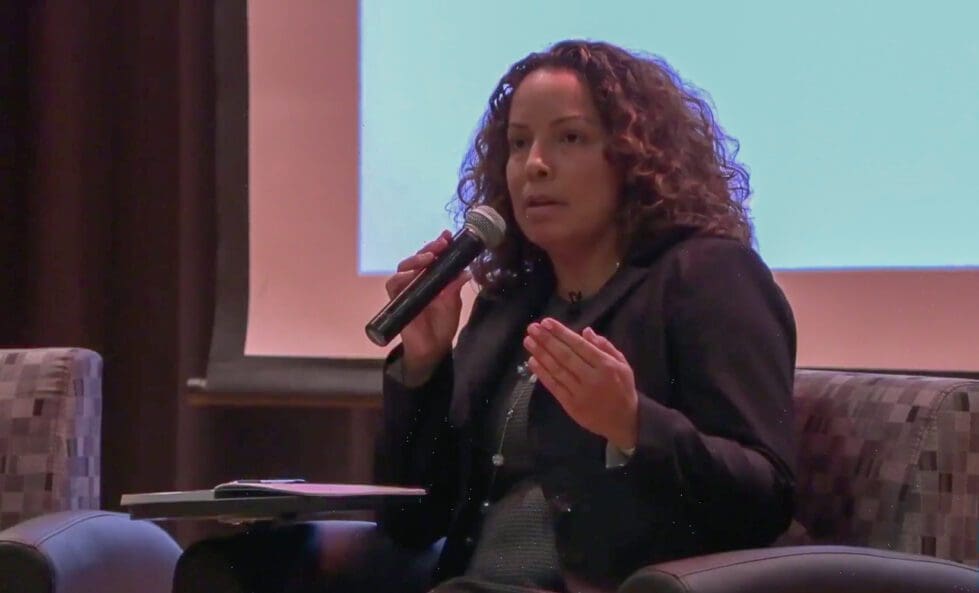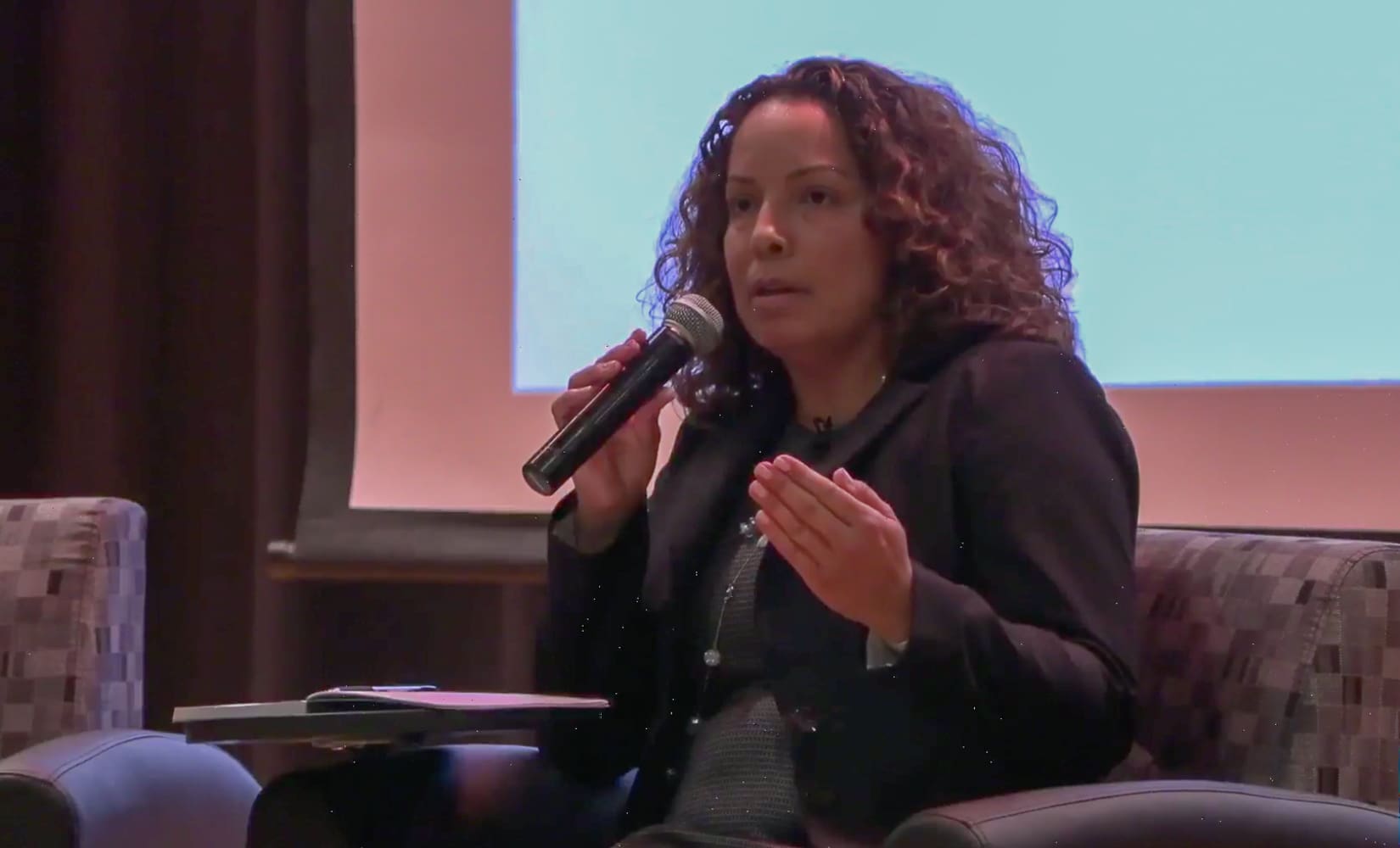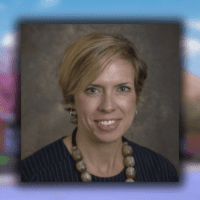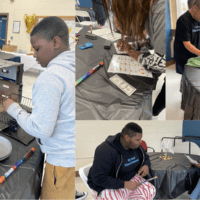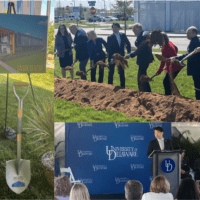The only finalist for the job of executive director of the Wilmington Learning Collaborative established her goals, described her stances on key education issues and answered some fun personality questions during a town hall Tuesday night.
“The pace of change doesn’t always align with what we want to see immediately,” said Wilmington resident Laura Burgos. “I think we have an opportunity to really identify two or three strategic priorities for the year ahead,“where we can test out and pilot some solutions in our respective schools and do it in a way where there’s some cohesion and some continuity across our efforts.”
Burgos, an experienced educator with lots of work in philanthropy and advocacy, appears to be in prime position to be hired after the other finalist, Edward Ryans, withdrew last week.
Ryans has worked as a teacher and administrator in primary and secondary education and is in his 30th year working in Prince George’s County Public Schools, Maryland’s second-largest school system with more than 130,000 students.
RELATED: Learning Collab picks 2 finalists for executive director
The reason for his withdrawal, which came last Tuesday, is unclear.
The Wilmington Learning Collaborative is a state agency created in November 2022 that aims to improve the educational and societal outcomes for children in nine city elementary schools across Brandywine, Red Clay and Christina school districts.
By giving families a voice in policy making, it hopes to empower city residents and combat challenges like low test scores and graduation rates and high absenteeism, as well as improving other achievement metrics.
The collaborative also hopes to connect families with social services to address issues such as homelessness, poverty and hunger that can affect education.
Hiring an executive director will send planning into high gear.
In addition to supervision over business and affairs, administrative management and being responsible for the work of the collaborative, the executive director will administer the budget and relay financial information to the treasurer.
The person selected will attend all meetings to discuss and introduce measures, but will not have voting privileges.
Town hall answers
Shelley Rouser of Delaware State University, who was brought on to the learning collaborative as a project manager, led the questioning.
Burgos made clear that her initiatives will come with collaboration, saying co-created solutions driven by root causes analysis is key to effective outcomes.
The most significant opportunity the collaborative has, she said, is to redefine change from the ground-up in a way that empowers and uplifts teachers and families.
To combat the teacher shortage and improve teacher recruitment and retention, Burgos said it’s essential to provide support to educators as well making sure they don’t feel isolated.
By investing in teachers through mentorship and professional development opportunities will also help with the problem, she said.
“It starts from the very beginning, how are we developing the next generation of school leaders?” she said. “That starts by identifying our classroom educators and providing clear, authentic internship and externship experiences to develop the next generation of leaders.”
She said there should be clear communication on strategies and plans among administration, and both teachers and principals need to develop as strong community and school leaders.
It’s important to be transparent with the collaborative’s budget, she said, as well as creating a clear narrative on how each budget line item affects the agency’s plans moving forward.
Burgos also applauded the nature of Wilmington.
“I’ve been here just shy of two years, and one thing I’ve learned is that the Wilmington community is tight knit, it’s resourceful, it’s easy to access,” she said, “meaning that even as a newcomer, I was able to tap in with a number of leaders by conducting simple cold call outreach. It is a warm and welcoming community.”
She said the plans of the collaborative must take into consideration the historical and generational nuances of the community.
“We can not discuss the challenges that we’re facing in our schools today without discussing history, without discussing historically, what created some of what we’re seeing today,” she said, talking about educational inequity. “It’s very important to spend the time with our teams, doing the journey mapping, walking through our own understanding of racial equity and how it has informed and shaped our personal lives.”
She had a different perspective on the achievement gap in Wilmington schools.
“I feel that the term itself is rooted in a racist narrative, where we’re comparing one subgroup of students to a bar that we feel is set by another group of students,” she said.
The approach when addressing any achievement discrepancies needs to change, she said.
“One thing we can do is reframe that narrative, not as an achievement gap, but as really individualizing our approach to different students subgroups,” she said, “and being very honest about the persistent inequities, beyond education, like health care, housing, and how everything contributes to what we’re seeing in our classrooms today.”
Her priorities for her first 90 days on the job, she said,would be getting to know the community by creating relationships, building a communication strategy and building a team infrastructure within the collaborative.
Burgos joked that in today’s age, she’s a much bigger fan of fictional literature in order to escape reality.
She said although she was born and raised in New York, she will opt for Chinese food over the famed $1 pizza slices.
She said she also makes a darn mean turkey chili.
Background on Burgos
Burgos is a career educator who’s served in the public, nonprofit and private sectors.
She’s most recently served as an education researcher, co-designing research projects and partnering with the educational-technological community across the country.
Prior to that, she served as the director with Youth Invest Partners, where her work focused on leading multi year-investments in initiatives focused on improving education and health outcomes for marginalized communities.
She also was a consultant for the company, supporting their racial equity work.
Burgos started in the philanthropy sector with the University of Virginia, where she was district support chief as part of the partnership for leaders and education, a joint venture between the Darden School of Business and the Curry School of Education. There, she managed a portfolio of six school districts serving as a critical piece to district leaders by leading school transformation efforts.
Her leadership focused on coaching education leaders on the implementation of district wide action plans, and services on improving education outcomes for historically underserved students.
Prior to joining UVA, Burgos completed a year-long doctoral residency at the University of Washington Center for Educational Leadership. It’s a nonprofit service arm of the university dedicated to eliminating educational inequities through developing the instructional leadership capacity of school and district leaders.
During her residency, she conducted a deep analysis of the organization’s capacity to meet the needs of future education leaders. Her work resulted in a set of recommendations the organization has incorporated into their strategic renewal efforts.
Burgos has served as a public charter school principal, elementary school teacher and nonprofit leader.
She spent 14 years working to improve outcomes for students throughout New York City, including serving on the founding administration team of a charter school, partnering with national corporations and providing apprenticeship experiences to public middle school students.
Burgos has three degrees: a 2000 bachelors in telecommunications from Penn State University; a 2003 master’s in elementary education and teaching from Brooklyn College; and a 2018 doctorate in education leadership from Harvard University’s Graduate School of Education.
To watch the full town hall, click here.
The collaborative’s governing council will vote on whether to elect Burgos as the agency’s first executive director at its meeting Thursday, which can be watched here.


Raised in Doylestown, Pennsylvania, Jarek earned a B.A. in journalism and a B.A. in political science from Temple University in 2021. After running CNN’s Michael Smerconish’s YouTube channel, Jarek became a reporter for the Bucks County Herald before joining Delaware LIVE News.
Jarek can be reached by email at [email protected] or by phone at (215) 450-9982. Follow him on Twitter @jarekrutz and on LinkedIn
Share this Post

